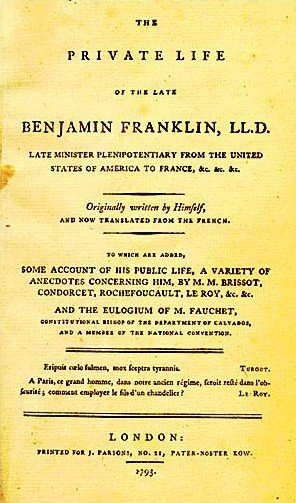Autobiography
Autobiography is a literary genre that involves an author writing about their own life. Unlike biographies, which are written by someone other than the subject, autobiographies are penned by the subjects themselves, offering a personal insight into their thoughts, feelings, and experiences. This form of writing spans various styles and approaches, from comprehensive accounts covering the entirety of the author's life to more focused narratives highlighting specific periods or events.
Definition and Characteristics[edit | edit source]
An autobiography is a self-written account of the life of oneself. The word "autobiography" was first used deprecatingly by William Taylor in 1797 in the English periodical The Monthly Review, when he suggested the word as a hybrid, but condemned it as "pedantic". However, its use has become standard. Autobiographies are marked by their personal tone and intimate details, which often include reflections on the author's public and private life, thoughts, and emotions. They can also explore themes of identity, morality, and culture.
Historical Development[edit | edit source]
The origins of autobiographical writing can be traced back to antiquity, with works such as Augustine of Hippo's Confessions in the 4th century, which is considered one of the first Western autobiographies. The genre has evolved over centuries, with notable examples including The Book of Margery Kempe (circa 1438), considered the first autobiography in English, and more modern works like The Story of My Life by Helen Keller.
In the 20th and 21st centuries, the genre has expanded to include a diverse range of voices and experiences, including those of marginalized and underrepresented communities. This period has seen a significant shift towards more experimental forms of autobiographical writing, such as memoirs, personal essays, and autofiction, blurring the lines between fact and fiction.
Structure and Form[edit | edit source]
Autobiographies can vary widely in their structure and approach. Some follow a chronological order, while others may adopt a more thematic or fragmented structure. The writing style can range from straightforward and factual to more poetic and reflective. Despite these variations, most autobiographies aim to provide a truthful and honest account of the author's life, making authenticity a key element of the genre.
Ethical Considerations[edit | edit source]
Writing an autobiography involves various ethical considerations, particularly regarding the portrayal of other people. Authors must navigate the challenges of representing real individuals with accuracy and fairness, often balancing their own perspective with the potential impact on those mentioned in their work.
Notable Autobiographies[edit | edit source]
- Confessions by Augustine of Hippo - The Story of My Life by Helen Keller - Long Walk to Freedom by Nelson Mandela - I Know Why the Caged Bird Sings by Maya Angelou - The Diary of a Young Girl by Anne Frank
See Also[edit | edit source]
- Biography - Memoir - Diary - Autofiction
This article is a literature-related stub. You can help WikiMD by expanding it!
Transform your life with W8MD's budget GLP1 injections from $125 and up biweekly
W8MD offers a medical weight loss program NYC and a clinic to lose weight in Philadelphia. Our W8MD's physician supervised medical weight loss centers in NYC provides expert medical guidance, and offers telemedicine options for convenience.
Why choose W8MD?
- Comprehensive care with FDA-approved weight loss medications including:
- loss injections in NYC both generic and brand names:
- weight loss medications including Phentermine, Qsymia, Contrave, Diethylpropion etc.
- Accept most insurances for visits or discounted self pay cost.
- Generic weight loss injections starting from just $125.00 for the starting dose
- In person weight loss NYC and telemedicine medical weight loss options in New York city available
Book Your Appointment
Start your NYC weight loss journey today at our NYC medical weight loss, and Philadelphia and visit Philadelphia medical weight loss Call (718)946-5500 for NY and 215 676 2334 for PA
Search WikiMD
Ad.Tired of being Overweight? Try W8MD's NYC physician weight loss.
Semaglutide (Ozempic / Wegovy and Tirzepatide (Mounjaro / Zepbound) available. Call 718 946 5500.
Advertise on WikiMD
|
WikiMD's Wellness Encyclopedia |
| Let Food Be Thy Medicine Medicine Thy Food - Hippocrates |
Translate this page: - East Asian
中文,
日本,
한국어,
South Asian
हिन्दी,
தமிழ்,
తెలుగు,
Urdu,
ಕನ್ನಡ,
Southeast Asian
Indonesian,
Vietnamese,
Thai,
မြန်မာဘာသာ,
বাংলা
European
español,
Deutsch,
français,
Greek,
português do Brasil,
polski,
română,
русский,
Nederlands,
norsk,
svenska,
suomi,
Italian
Middle Eastern & African
عربى,
Turkish,
Persian,
Hebrew,
Afrikaans,
isiZulu,
Kiswahili,
Other
Bulgarian,
Hungarian,
Czech,
Swedish,
മലയാളം,
मराठी,
ਪੰਜਾਬੀ,
ગુજરાતી,
Portuguese,
Ukrainian
Medical Disclaimer: WikiMD is not a substitute for professional medical advice. The information on WikiMD is provided as an information resource only, may be incorrect, outdated or misleading, and is not to be used or relied on for any diagnostic or treatment purposes. Please consult your health care provider before making any healthcare decisions or for guidance about a specific medical condition. WikiMD expressly disclaims responsibility, and shall have no liability, for any damages, loss, injury, or liability whatsoever suffered as a result of your reliance on the information contained in this site. By visiting this site you agree to the foregoing terms and conditions, which may from time to time be changed or supplemented by WikiMD. If you do not agree to the foregoing terms and conditions, you should not enter or use this site. See full disclaimer.
Credits:Most images are courtesy of Wikimedia commons, and templates, categories Wikipedia, licensed under CC BY SA or similar.
Contributors: Prab R. Tumpati, MD





